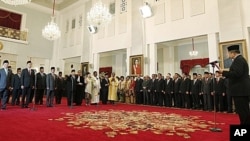Indonesian President Susilo Bambang Yudhoyono has announced major changes to his cabinet. Analysts say the long-anticipated cabinet reshuffle was a move to solidify political support and to boost the president's sagging approval rating.
President Yudhoyono says his reasons for changing 12 of the heads of Indonesia's 34 ministries were to improve the performance and effectiveness of his administration. When he announced the long anticipated cabinet shake-up, the president stressed that the selection process was based on extensive consultations with political leaders from a number of parties.
He says the reshuffle process was systematic, accountable, well planned and took into account a number of factors.
Analysts say politics also played a role. Although President Yudhoyono won a landslide re-election victory in 2009 with more than 60 percent of the vote, his Democratic party only controls 25 percent of the seats in parliament. To gain a working majority there, the president had to invite his rival parties to join a grand coalition and awarded cabinet positions to opposing party officials.
Political commentator Wimar Witoelar says, because of this arrangement, the president appointed some rival party members in the cabinet who worked to undermine his agenda.
"People who are, you know, using the cabinet position for political ends. People who are subverting the government policies for party gain. And, people who are just not performing. So as I see it, three shortcomings, various cabinet ministers have in different measures is ineffectiveness, disloyalty, and hidden agenda."
The new cabinet still includes members of other parties. The Golkar party, which holds significant power in the house of representative, retains three cabinet positions. But the new heads of the strategically important ministries of State Owned Enterprises, Energy, Trade, Law and Human Rights all come from the president's Democratic party.
Also important, Witoelar says, was the change the president did not make, despite pressure from Golkar party chairman and businessman Aburizal Bakrie.
"For me the most significant non-change is for the Finance Minister Agus Martowardojo to remain in place, despite heavy pressure and almost blackmail the most powerful politician businessman in the country and the president did not give in," noted Witoelar.
Witoelar says sound fiscal policy has been the cornerstone of Yudhoyono's tenure, which helps maintain investor confidence and strong economic growth.
In other areas, such as building badly need infrastructure and increasing access to health care and education, the president has not been as successful.
And, Yudhoyono's sagging approval poll numbers, which have fallen from 60 percent in 2009 to 47 percent, and high profile corruption scandals like one involving Muhammad Nazaruddin, a former Democratic party treasurer who is alleged to have stolen more than $352 million, have weakened his administration.
Despite the cabinet changes, Witoelar and other political observers expect political gridlock will continue to stifle major legislative initiatives.
Indonesia Cabinet Shake Up Unlikely to End Political Gridlock
- By Brian Padden





